Welcome from the Dean
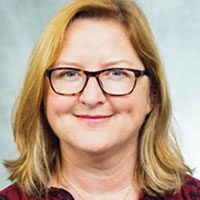
Dean Mercy Cannon
As the air turns crisp, the semester feels rich with events, classwork, and festive opportunities like Homecoming. It’s a wonderful time to be on campus. In my three months at EKU, I have begun to appreciate even more the generous people and welcoming environment here.
CLASS has experienced enrollment growth from Fall 2021 to Fall 2022: we have approximately 140 new students in our majors, bringing us to a total of 2,965 students in undergraduate and graduate programs. This number is so much more than a headcount. Each student in our college has unique dreams and motivations as they strive to earn a college degree. When they leave here, each individual will create positive impacts as they put their education into practice within their workplaces and communities. They will change the world through habits of excellence, critical thinking, clear communication, and resilience. Whether they are seeking a degree in psychology, art, history, sociology, political science, social work, or any of the many CLASS programs, students develop the essential skills they need to succeed in their chosen profession.
EKU offers students the opportunity to learn and grow, and to become the engaged, responsible citizens that this world needs. Faculty and staff here show their commitment to students daily, and I am honored to be a part of this good work.
Mercy Cannon
PsyD Program Celebrates 50th Graduate
This month, 11 students earned Eastern’s Doctor of Psychology (Psy.D.) degree, marking the 50th graduate from the program. Launched in the fall of 2015, the program graduated its Dr. Theresa Botts teaching first cohort of four students in 2018. The program was initially accredited on contingency by the American Psychological Association (APA) in April of 2018, shortly before the first cohort of students completed the program. EKU received full accreditation from APA for 10 years in 2020.
Dr. Dustin Wygant, director of Clinical Training and Executive Director of Integrated Behavioral Health, notes the following program highlights:
- The primary training facility in the program, the EKU Psychology Clinic, recently relocated to the Rowlett Building to better integrate care with the EKU Counseling Center and EKU Student Health Services. The Clinic offers assessment, consultation/outreach, and psychotherapy services, including specialty clinics in Trauma/Suicide Prevention and Autism/Developmental Disabilities.
- The Psychology Clinic operated a fully remote presence during the height of the Covid-19 pandemic and has returned to a hybrid of remote and in-person services.
- We were the first training clinic in the state to operate a remote clinic during the pandemic and we lead the state in training in telehealth.
Since its launch, the program has added two new core clinical faculty members, Dr. Maggie Freeman (a 2020 graduate of the program) and Dr. Joshua Turner (who received his undergraduate and master’s degrees from EKU).
Other faculty members involved in the program include Dr. Theresa Botts (director of Admissions, director of the Psychology Clinic), Dr. Myra Beth Bundy, Dr. Jonathan Gore, Dr. Sara Incera, Dr. Adam Lawson, Dr. Michael McClellan, Dr. Melinda Moore, Dr. Jerry Palmer, Dr. Alex Varakin, and Dr. Dustin Wygant.
Doctoral students have completed/are currently completing internships in 25 states, the highest percentage in Kentucky (22%), followed by Ohio (11%), Indiana (10%), and Colorado (6%).
Internships completed by our students cover a wide spectrum of settings, including VA medical centers (22%), child/adolescent-focused treatment facilities (22%), hospital settings (17%), university counseling centers (14%), and correctional facilities (8%).
Where are our graduates working?
Following graduation, students are working in 21 different states, the highest percentage being in Kentucky (36%), followed by Ohio and Illinois (6% each).
Graduates of the program are employed across a wide spectrum of clinical settings, including group/private practices (26%), VA medical centers (20%), child/adolescent-focused treatment facilities (16%), hospital settings (14%), forensic/correctional settings (12%), and university counseling centers (10%).
One of our recent graduates, Captain Anna Stanton, completed a military internship with the U.S. Air Force and is currently stationed at Little Rock Air Force Base in Arkansas.
Places and Programs
El Centro: The Bobby Verdugo and Yoli Ríos Bilingual Peer Mentor and Tutoring Center
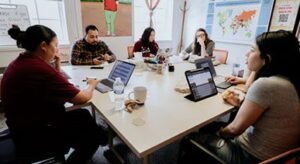
Students at the Bobby Verdugo and Yoli Ríos Bilingual Peer Mentor and Tutoring Center
As we celebrate Latinx Heritage Month, September 15 – October 15, we shine a spotlight on the Bobby Verdugo and Yoli Ríos Bilingual Peer Mentor and Tutoring Center – affectionately known as “El Centro.” Featuring study rooms, quiet spaces, comfortable gathering places, El Centro is a place many Latino students call home. All students find El Centro a valuable source of academic and social support, and it also serves as the launch pad for many campus-wide events.
El Centro services:
“I come to El Centro to study and talk to people who can help with my homework. I feel like this environment is for me.” — José Bartolo Martínez, Criminal Justice and Spanish double major.
- Tutoring: El Centro offers bilingual tutoring for students interested in multilingual and multicultural community building and scholarship. Bilingual tutoring covers subject areas such as anthropology, sociology, social work, public health, sciences, and many others, and language tutoring is available for Spanish, German, Chinese, and Japanese.
- Mentoring: Each student is assigned a peer mentor based on major, academic, or personal needs. Within each mentoring session, students can receive help with navigating college, class advising, schedule building, networking, interview skills, email best practices, applications, essays, resumes, cover letters, scholarships.
- Support: El Centro hosts a biweekly Latino and Hispanic Student Support/Discussion Group led by two bilingual Latina graduate students in the PsyD program, Yadira Diaz Romero and Vanessa Leon.
“I come to El Centro because it is a place where I can get help with my homework and a place where I have been able to make friends.” — Angela Trujillo, Spanish Teaching.
At the midpoint of Fall 2022, students have already visited El Centro 618 times!
Dra. Gabriella Gutierrez y Muhs, renowned Chicanx professor, author and poet, gave EKU’s Chautauqua Keynote for Latino Heritage Month on October 6, 2022. At the end of her visit, she noted, “I am so very fortunate to have gone to EKU to Keynote. They [Spanish faculty] are truly modeling avant-garde methodologies and leadership paradigms.Their hospitality was unequaled and genuine. I won’t begin to speak of the meals I had….the experience: sensational.”
Recent Outreach Events
- Latinx Street Fair: A university-wide celebration in the middle of campus featuring music, dancing, food, art, textiles, history. We hosted students from Shelby County High School (brought by alumna Ms. Lauren Pais), Franklin County (brought by adjunct faculty Ms. Melony Martínez, HS and Model). Model students, taught by EKU alum and former Centro peer mentor and tutor Ms. Jeniffer Paxtle-Granjeno, partnered with Prof. Manuel Cortés to prepare students to read their original Spanish poetry and sing as part of the festivities.
- College Night at Actividades Bilingues/Bilingual Activities at the Madison County Public Library. Madison Central Spanish teacher and former peer mentor and tutor at El Centro, Ms. Andrea Patiño, joined with her students and their families.
- Juntos a la Universidad Prepárate College Night at Tates Creek High School “Mi lenguaje, mi cultura, mi futuro: Spanish at EKU” (My language, my culture, my future: Spanish at EKU).
- Kentucky Refugee Ministries: El Centro students and faculty hosted high school and BCTC students and staff from Kentucky Refugee Ministries for a campus visit.
- Health and Resource Fair at San Juan Diego Center in Lexington. El Centro hosted a table and students volunteered in various capacities by providing interpreting and translations services at this event for the Latino community in Lexington.
Bluegrass Writers Studio Awarded Best Low-Residency Program of 2022
Bluegrass Writer’s StudioIn its annual ranking of the Top Online Master’s in Creative Writing Programs, Intelligent.com ranked Eastern Kentucky University No. 3 overall and Best Low-Residency Program.
Robert Dean Johnson, director of EKU’s Bluegrass Writers Studio and professor of English, stated, “Bluegrass Writers Studio is unique among low-res programs because we’ve worked hard to make it a true writing community, accessible to anyone in the country, no matter where they live.” …. MORE.
Faculty/Staff and Student Spotlight
Dr. Richard Waters: School of Music
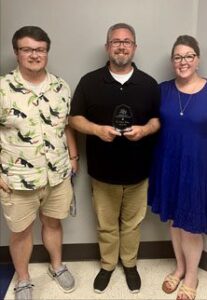
Dr. Richard Waters
EKU’s own Dr. Richard Waters recently was awarded the 2022 Robert K. Baar Choral Excellence Award. This award is given to only one recipient each year to an outstanding choral educator in Kentucky. Members of the Kentucky American Choral Director’s Association (KYACDA) nominate choral conductors in Kentucky based upon their contribution to choral directing and choral education. A committee reviews each nomination and selects an outstanding candidate and presents the award at the summer KYACDA conference. The Baar Award began in 1994.
Dr. Waters is the first and only EKU choral director to win the award. In order to be nominated for the award, each candidate needs 15 years of experience in the choral arts and to be dedicated to promoting music education in Kentucky. Dr. Waters is now honored among the top choral educators in the commonwealth which includes choral directors from the University of Louisville and the University of Kentucky.
Additional accolades in Dr. Waters’s distinguished career include: College/University Teacher of the Year for KMEA District 11 in 2012 and 2016, as well as the Distinguished Educational Leadership Award from the EKU Student Government Association in 2016 and 2017. At Delta State University he received the 2008 DSU Foundation Prize for Excellence in Teaching.
Part of the EKU faculty since 2011, Dr. Waters is Director of Choral Activities, Voice Area Coordinator, and Professor of Music at Eastern Kentucky University. He maintains an active schedule as a composer, clinician, and adjudicator. Choirs under his direction have been invited to perform at the ACDA Southern Division Conference (Memphis, 2010), the Kentucky Music Educators Association state conference (2016, 2021, 2022), and the Mississippi ACDA/MMEA state conference (2007, 2011). His choirs have performed in many notable national and international venues, including Carnegie Hall, York Minster, Salzburg Cathedral, and have toured throughout England, Austria, the Czech Republic, and Ireland.
For more information, visit the Richard Waters website.
Carley Frost, Current Student Spotlight
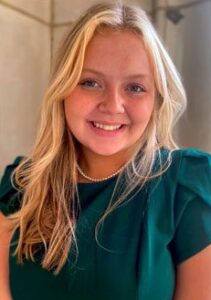
Carley Frost
Q: What is your major and area of interest?
A: I’m currently majoring in Political Science and Criminal Justice, with a minor in Pre-Law.
Q: What made you decide on this major?
A: To be completely honest, my first brush with interest in law and political science came from Legally Blonde (no joke). Following my high school graduation, I was able to intern for an attorney in my hometown and help oversee her campaign process in the 2020 senate election. From there I decided political science and law school was the path for me!
Q: What are some of the ways you’ve become involved in the department?
A: I am currently captaining the mock trial team and have been a member since my freshman year. We’ve been able to visit several states and win tournaments all over the country. I was awarded an outstanding witness award at both MIT and Kennesaw State. We have also been successful in our journey to the opening round championships at the national level. Mock trial has been an outlet of friendships and a way to experience the courtroom setting!
Q: What would you say to a prospective student about your Eastern education?
A: Through my connections at Eastern, I’ve been able to make life-long friends and meet professors that have made lasting impacts on my educational career. I’ve also had the pleasure of working closely with the mock trial coaches, who have both supported and guided me through my entire career at Eastern. Implementing myself in the Department of Government has given me tools for my future that will ensure my success in future endeavors, law school will see me soon!
Alumni Spotlight
Neil Kasaik
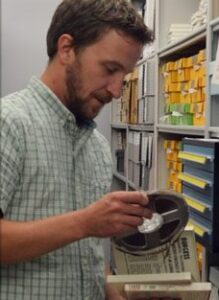
Neil Kasiak
Q: What was your major and specific area of study within the major?
A: After getting married in 2008 and living in Oregon until 2010, our soon to be growing family relocated to the Lexington area for a job transfer. Upon acceptance into the EKU History MA Program, I really didn’t know where my graduate education would take me, but I knew I wanted to write, learn, and grow my mind; and write some more. Additionally, I knew two other things for certain in August of 2010: (1) I love learning about humans and (2) my curiosity always pushes me to learn more than the day before. With those factors in mind, I chose the Master of Arts in History thesis track.
As I explored my options in the program, two areas of study quickly came into focus—cultural collisions and thorough archival research. Chasing potential thesis options eventually led me to the collision of the colonial Spanish and indigenous Aztecan cultures. The freedom of choice in my thesis helped me realize that I’ve always been fascinated by the early years of cultural contact between civilizations, an epiphany of sorts that’s only grown through the years and expanded well beyond Mexico City. With an emphasis on the cultural collisions between the Spanish colonial apparatus and pre-Columbian societies, I was able to blend my interests in food pathways, resource commodification, and cultural exchange to develop my thesis, Fermenting Identities: Race and Pulque Politics in Mexico City between 1519 and 1754. The guided development of my ideas from thought exercises to a completed thesis is a process I’ll never forget.
A second major highlight of my time as an EKU grad student would have implications that reached into the future and paved the way for my current career trajectory. Early in my graduate studies, October of 2010 to be exact, my HIS-800 class visited EKU’s Special Collections and Archives for an introductory show-n-tell archival experience. By the end of my time in graduate school I considered the process of writing my thesis as one of the most rewarding experiences I had up to that point in my life, but that first visit to SCA with Dr. Brad Wood’s HIS-800 was truly life changing. I began to appreciate archives as living and breathing features of cultural heritage and preservation—true bastions of knowledge. I followed up on an offer to become a volunteer and the rest is, well, history. Through the History Department’s practicum course offerings, and under the guidance of a very talented EKU Archivist, Jackie Couture, I began my trainings in archival theory and best practices, which led me to my present position and career path in oral history and archives.
Q: What was your favorite class/professor – and why?
A: Every assignment, every professor, and every course were my favorite in the moment, but if I had to choose, I would narrow it down to two: a self-guided independent study of Afghanistan with Dr. Jackie Jay and Dr. David Coleman’s The Worlds of 1492. Both courses provided me with noteworthy insights into the ways that cultural and historical memory can change through time, which, in turn, helped me to better understand how complex and messy the study of history can get. For some folks that messiness becomes a deterrent. For me, untangling those complexities and uncertainties is a truly invigorating process. Under the guidance of Drs. Jay and Coleman I began to see history much like I was beginning to understand the archival world under the guidance of Couture—both are a living, breathing, and complex feature of the human experience that is sustained by the continued efforts of passionate, curious, and service oriented individuals. Those complementary intellectual revelations were a game changer for me—I’ve never looked back.
I would be remiss if I didn’t mention Dr. Carolyn DuPont’s Civil Rights class and her influence on both my writing skills and my understanding of the fundamental intricacies of historical narrative. I’ve always credited and am eternally grateful for Dr. Dupont’s efforts in helping me work out what it means to be an exceptional historian. She helped shape my writing style and revealed the importance of written works that dissect complex narratives with a strong voice— I can literally hear her as I type this, “strong verbs, Neil, always use strong verbs!”.
Q: What has your career journey looked like since graduation?
A: I couldn’t have asked for a more rewarding and meaningful path straight out of the program; a path that’s continued to this day and is entirely accredited to the professionalization process I experienced as a History MA student. After graduating in the Spring of 2012, the History Department Chair at the time, Dr. Chris Taylor, provided me a with an opportunity that I thought would’ve only remained a daydream. Thanks to Dr. Taylor’s early support, I found myself in front of students in a dual-credit capacity. Just a few semesters later I landed on the main Richmond campus as a survey U.S. History instructor. This surreal development and the continuation of my archival training left me feeling fulfilled as young professional. To be quite honest, my career successes were only made possible by my graduate studies and the opportunities the History Department provided. Nowadays, I like to think that they saw something in me that I didn’t yet understand existed. Rather than explicitly pointing it out, they provided me with the tools I needed to go out and do good in the world so I could discover that indescribable “something” on my own. Pretty sure I’ve found it, and I’m loving it!
As I continued to develop my own courses and pedagogy as an adjunct, I carried on with the archival training that began during my graduate studies. Volunteer hours in SCA eventually led to smaller paid project archivist assignments. Eventually, EKU’s dormant oral history center was revived under the William H. Berge Oral History Center banner. I was qualified to apply for the Oral Historian/Archivist position, was hired, and began my work as an Oral Historian and Archivist during the summer of 2015. The practice of interviewing was a skill I picked up as an undergraduate at Purdue University, West Lafayette. However, and like so many other oral history practitioners, interest in documenting my own family history during graduate school led me to conclude that the craft of oral history combines all my interests into a neatly packaged career path with wide open and creative potential. I find it incredibly difficult to think of a more desirable career than documenting, preserving, and curating cultural heritage and historical memories for posterity’s sake.
Since being hired full time, I’ve developed a series of oral history projects in collaboration with faculty and community partners that have been met with great success. The projects I’ve taken part in have been a culmination of the guidance and training that can all be traced back to the History MA program. The History Department helped me develop theoretical foundations that I use daily. The program built up a sense of confidence, scholarly self-worth, and belief in the Humanities that I’m confident will never stop growing.
Anyone who knows me well will tell that I frequently say, “I have the greatest job on the planet. I get to hear stories from all corners of society and preserve them.” Hypothetically, I could interview an EKU Alum in the morning, an Armed Forces Veteran at lunch, and then head out to Eastern Kentucky for an evening interview with a 4th generation hillside farmer—if you ask me, that’s truly the greatest job in the world. None of this would be possible had it not been for all the mentors I now call my colleagues and friends. Honestly, calling my former Professors by their first names took an easy 3 years post-graduation and was the hardest part of entering the professional world.
Q: What unexpected benefit has your college degree given you? That is, in what ways has your education prepared you for life beyond work?
A: The unexpected benefits of my time at EKU are many. The confidence I’ve gained in answering complex questions about the past helps me in my daily life and in ways that are revealed in unexpected ways. A well-developed sense of empathy and perspective on cultural and historical differences are two of the biggest take-aways beyond my professional accomplishments. Furthermore, a deeper understanding of how cultural and historical perspective shapes and changes society and culture through time, for better or worse, is an additional feature of my education that I use in my daily life and in regular conversations with friends and strangers alike. In exploring so many wide open, yet meaningfully structured assignments and after navigating numerous self-guided information gathering expeditions of great length, I walked away from the MA program with a skill set that allows me to answer pretty much any question I may have. Granted, the older I get the fewer concrete answers there seem to be, but my graduate studies made me feel comfortable and at peace with the fact that we can’t know everything immediately—a tough lesson to learn in these times of instant gratification and 280-character limits on information. Some questions take time and frequently the “ah-ha” moments along the way will only come with patience and due diligence.
I’m a living example of a lifelong liberal arts (and interdisciplinary) learner. If not for my time at EKU, I’m not entirely sure that I would self-identify with such a label at my age.
From raising my two rambunctious children, James and Jonah, to talking with elders at the supermarket, my time at EKU has made me a better husband, father, friend and stranger who makes friends by listening to and respecting perspectives that are different from my own.
I was told long ago by a family mentor, “Neil, college doesn’t really teach you anything, per se, but it does teach you how to find answers.” At the time, and for many years after, I was reluctant to accept that rather prophetic statement. However, looking in the rearview in the now, my graduate studies helped me develop the confidence and wherewithal to find answers. That’s my biggest takeaway outside of the successes in my professional career—curiosity is one thing, but knowing how to manage and learn from your curiosities, no matter how big or small, is a life skill that’s hard to learn yet priceless and irreplaceable once it’s internalized.
Q: Any other information you’d like to share in your spotlight.
A: Being a part of the EKU Community has become a fundamental part of my professional and personal identities. I genuinely believe in this University, its people, and our mission to help others better their lives and grow as individuals. Never would I have expected that my path in life would have taken me to Eastern Kentucky; however, my roots have grown deep in the region and I really can’t image myself living, working, playing, or raising my children anywhere else. In pursuing graduate education, I found a career, in finding a career I found a home in Kentucky, and I can honestly say that EKU and the History Department has played an oversized role in that process. And, finally, on behalf of myself and my season ticket holding children—GO, EKU BASEBALL, GO!